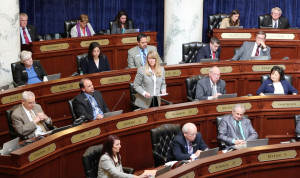Based on last year’s SAT results, about 20 percent of Idaho’s high school juniors are prepared for college or a career, an Idaho business leader told the Legislature’s education committees Wednesday.

Idaho Business for Education board chairman Bob Lokken released a report called “2015 Idaho High School Career & College Readiness Scores,” breaking down juniors’ SAT scores by individual districts and schools.
The reports were built around results from the spring 2015 SAT test, results were publicly released about seven months ago. To determine college and career readiness, IBE used a cut score of 500 on the SAT’s three sections: reading, math and writing.
Lokken said the report’s findings are important in light of work force needs and the state’s flagship education goal of having 60 percent of Idaho’s 25- to 34- year-olds hold a postsecondary degree or certificate by 2020.
“If outcomes don’t change, the future for our state, for our businesses and our students is pretty dim,” Lokken told the House Education Committee Wednesday morning.
Lokken made a similar presentation to the Senate Education Committee Wednesday afternoon.
The reaction from lawmakers was generally receptive. Some lawmakers — such as Sens. Mary Souza, R-Coeur d’Alene, and Cherie Buckner-Webb, D-Boise — suggested the sobering numbers could be a catalyst for change.
Two retired educators cautioned against reading too much into SAT scores — and pointed out that Idaho high school students are also faring well in dual-credit college classes.
“I hope we’re very careful how we use this report,” said Sen. Janie Ward-Engelking, D-Boise, a retired teacher. “This is just one measure.”

Rep. Ryan Kerby, R-New Plymouth, a retired school superintendent, said raising SAT scores is a difficult and complex issue. “I hate to try to tell everybody to have to have higher (SAT scores) without explaining how to get there.”
Not reaching SAT benchmarks does not doom a student to failure, Lokken said. He wishes there was a more complete indicator of college readiness.
One lawmaker clamored for more data. Rep. Judy Boyle, R-Midvale, complained that SAT data from her local school district and nine others were redacted due to state and federal student data privacy laws.
“I have had it with this,” Boyle said. “We’ve got to find a way where we can find out, and parents can find out, how their school is scoring on these things. We can’t change anything if we don’t know.”
Lokken and a State Board of Education spokesman said state and federal data privacy laws apply when 10 or fewer students take the test.
Idaho Business for Education is made up of CEOs and corporate officers from 148 businesses statewide, Lokken said.
Lokken’s data appears similar to data used in the current, controversial Don’t Fail Idaho advertising campaign. Citing SAT results, the Don’t Fail Idaho advertisements say four out of five Idaho students are not ready for life after high school.
School leaders from Boise, Emmett and Eastern Idaho have condemned the Don’t Fail Idaho advertisements. They say the ads are divisive and do not reflect what is going on in schools. Boise superintendent Don Coberly attended the Senate Education hearing, but did not testify.
No lawmakers mentioned the Don’t Fail Idaho campaign during Wednesday’s hearings.
In other Statehouse action Wednesday:
Literacy. It was a literacy lovefest of sorts, as Senate Education got its first look at one of the bills designed to boost early reading skills.
On a unanimous vote, the committee endorsed House Bill 451, a parental notification bill. The bill would require parents of kindergartners through third-graders that their children are not reading at grade level. “It’s so vital to have parents involved in this,” said Rep. Julie VanOrden, R-Pingree, the bill’s sponsor.
The literacy initiative would require districts to provide individualized help for students who are struggling with reading. Based on fall 2015 Idaho Reading Indicator test scores, about 36,000 students would qualify for extra help.
HB 451 is part of Gov. Butch Otter’s larger $10.7 million literacy initiative. Legislative budget-writers haven’t yet decided how much money to put into literacy programs.
The parental notification bill heads to the Senate floor.
School safety. Following lots of questions, the Idaho House passed a bill designed to increase school safety.
Pushed by Rep. Wendy Horman, R-Idaho Falls, House Bill 514 would create the Office of School Safety and Security within the existing Idaho Division of Building Safety.

The new office would provide local schools with on-site security assessments and training and identify areas of vulnerabilities.
The new bill and Office of School Safety and Security are designed to build upon 2013 school safety audits, which found that unauthorized adults were able to enter 71 of the 74 schools studied.
“Doing our best to protect children in their schools is the proper role of government,” said Horman. The goal, she said, was to do “the best we can to prevent and prepare for the unexpected.”
Rep. Patrick McDonald, a Boise Republican and former U.S. Marshal, also argued in favor of the bill.
Nobody directly debated against the bill, but several of Horman’s fellow Republicans asked her probing questions about whether the bill would create more layers or red tape or open up the state to legal liability.
Horman said she was not setting out to increase the size or scope of government. The bill is designed to protect students and minimize liabilities.
The bill passed 51-18, with all dissenting votes coming from Republicans. Two of the no votes came from House Education members Reps. Sage Dixon, R-Ponderay, and Steven Harris, R-Meridian. There was no opposition to the bill in committee; Harris and Dixon supported the bill in committee before opposing it on the floor. (Use Idaho Ed News’ Bill Tracker to find out how all lawmakers voted on education bills this session).
The bill next heads to the Senate for consideration, and is likely to begin its journey in the Senate Education Committee.
Disclosure: Idaho Education News and the Don’t Fail Idaho advertising campaigns are both funded by a grant from the J.A. and Kathryn Albertson Family Foundation. The foundation also provided funding to Idaho Business for Education in 2015.
Idaho Education News reporter Kevin Richert contributed to this report.
